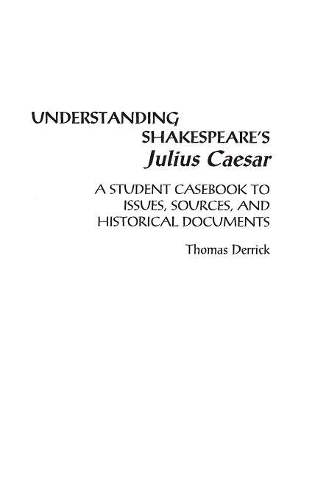
Understanding Shakespeare's Julius Caesar: A Student Casebook to Issues, Sources, and Historical Documents
(Hardback)
Publishing Details
Understanding Shakespeare's Julius Caesar: A Student Casebook to Issues, Sources, and Historical Documents
By (Author) Thomas Derrick
Bloomsbury Publishing PLC
Greenwood Press
24th November 1998
United States
Classifications
Tertiary Education
Non Fiction
Literary studies: c 1600 to c 1800
822.33
Physical Properties
Hardback
256
Description
This gathering of materials about Shakespeare's "Julius Caesar" aims to enrich students' understanding of the historical context of the play and encourage interpretations of its cultural meaning. Shakespeare's "Julius Casear" reflects perennial cultural concerns about order and freedom, particularly as they clash in the figure of Caesar and Brutus. This experiment in Shakespeare literacy features a wide variety of materials - from a modernized text of Plutarch's lives of Caesar and Brutus set on facing pages for easy comparison, to historical and contemporary parodies, to a rap version of the play. Study questions, project ideas and bibliographies provide additional sources for examining the cultural and historical context of the play. Following a literary interpretation of the play, Derrick presents a wide variety of materials, including: a modernized version of Plutarch's lives of Caesar and Brutus, set side-by-side to aid in the comparison of the characters; dramatic sequels to the play in the Elizabethan theatre; a comparison of Julius Caesar to the Lincoln assassination, with reprints of 19th-century newspaper accounts, John Wilkes Booth's obsessions about Brutus and the desperate notes he left after the assasination; excerpts from a popular culture, including a rap version of the play that is ideal for student performances, parodies from "Mad Magazine", James Baldwin's little-known appeal to African-American consciousness, "Why I Stopped Hating Shakespeare", and John Housman's reflections on making the film version that starred Marlon Brando; popular allusions to the play and its verse from the 18th century to the present; and a chapter on teaching the play that includes commentary by noted teachers and a parallel layout of a rendering in basic English alongside Shakespeare's edited play.
Reviews
If you are hot for Shakespeare, or even if you are not you will find an inspiring, well-developed, and entertaining approach to the bard's Julius Caesar contained within this volume, part of Greenwood's Literature in Context series. Organized in six sections. Derrick works miracles with the idea that Shakespeare is indeed accessible to young adults....Understanding Shakespeare's Julius Caesar brings to life the disparate worlds of history, theater, language, metaphor, plot, and source material, and applies each with a common-sense appraoch to dramatic literature....Useful to both the advanced seventh- to ninth-grade student and the average tenth- to twelfth-grader (not to mention teachers for those levels). This thoughtful and intelligent casebook is a highly recommended purchase for both middle to high school media centers and all public libraries.-VOYA
"If you are hot for Shakespeare, or even if you are not you will find an inspiring, well-developed, and entertaining approach to the bard's Julius Caesar contained within this volume, part of Greenwood's Literature in Context series. Organized in six sections. Derrick works miracles with the idea that Shakespeare is indeed accessible to young adults....Understanding Shakespeare's Julius Caesar brings to life the disparate worlds of history, theater, language, metaphor, plot, and source material, and applies each with a common-sense appraoch to dramatic literature....Useful to both the advanced seventh- to ninth-grade student and the average tenth- to twelfth-grader (not to mention teachers for those levels). This thoughtful and intelligent casebook is a highly recommended purchase for both middle to high school media centers and all public libraries."-VOYA
Author Bio
THOMAS DERRICK is Associate Professor of English at Indiana State University, where he has taught composition, literary criticism, and English Renaissance literature for a dozen years. He has edited Studies in Medieval and Renaissance Literature and is author of Thomas Wilson's Arte of Rhetorique (1982). He is the recipient of his university's highest teaching award and codirected a grant from the National Endowment for the Humanities on democratic education.
